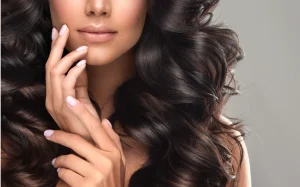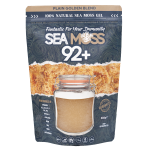HAIR AND NAIL HEALTH
HAIR AND NAIL HEALTH

Hair and nail health are vital aspects of overall well-being. Hair serves as a protective layer and can experience conditions such as alopecia, while nails act as shields for the fingertips and toes, susceptible to issues like onycholysis.
Symptoms include hair loss, dryness, flaking scalp, and soft or cracked nails. Various types of nail conditions and hair loss patterns exist, each with its own characteristics.
Causes range from micronutrient deficiencies to dryness, dehydration, stress, and anxiety. Medical treatments often involve the consumption of vitamins A, B7 (biotin), E, C, and D. Natural approaches include a balanced diet, good nail hygiene, hydration, and moisturising.
Nutrient-rich foods such as fruits, legumes, nuts, and dark vegetables, along with herbs like ginseng, horsetail, and nettle, play crucial roles in promoting hair and nail health.
Description
Hair and nail health are essential for our overall well-being and appearance. Healthy hair is strong, shiny, and minimises hair loss, while healthy nails are smooth, strong, and free from brittleness.
To maintain hair and nail health, a balanced diet rich in nutrients like vitamins, minerals, and proteins is crucial. Hydration plays a role in preventing dryness and brittleness. Proper care includes regular cleaning, trimming, and protection from heat and harsh chemicals.
Limiting the use of styling tools and protecting from sun exposure helps prevent damage. Medical conditions, hormonal imbalances, stress, and smoking can impact hair and nail health. Addressing these factors and adopting healthy habits contribute to improvement.
By focusing on nutrition, hydration, and care while addressing underlying issues, we can promote strong, shiny hair and resilient nails for a confident appearance.
Nail and hair issues can manifest with a variety of symptoms. Here are some common symptoms associated with problems related to nails and hair:
- Hair Loss: Sudden or excessive hair loss is a common sign of underlying issues, such as hormonal imbalances, nutrient deficiencies, or medical conditions.
- Dry or Dull Hair: Hair that appears dry, frizzy, or lacks its usual shine may indicate a need for better hair care or hydration.
- Hair Loss in Unusual Areas: Hair loss on parts of the body other than the scalp, like the eyebrows or eyelashes, can signal specific conditions or nutritional deficiencies.
- Soft or Loose Nails: Nails that are soft, bend easily, or frequently break can be indicative of nutritional deficiencies or nail health problems.
- Nail Separation: Opening or separation of the layers of the nails, known as onycholysis, can result from various factors, including trauma or underlying medical conditions.
- Cracked Nails: Nails that are cracked or split may be due to exposure to harsh chemicals, excessive moisture, or underlying health issues.
- Dandruff: The presence of white flakes in the hair or on the scalp can be a sign of dandruff, which may result from various causes, including dry scalp or fungal infections.
Hair Issues:
- Hair Loss (Alopecia): Hair loss can occur due to various factors, including genetics (androgenetic alopecia), hormonal changes, medical conditions, certain medications, stress, and nutritional deficiencies.
- Dandruff: Dandruff is a common scalp condition characterised by flaking and itching of the scalp. It is often caused by an overgrowth of yeast on the scalp.
- Dry and Brittle Hair: Hair can become dry and brittle due to excessive use of heat styling tools, exposure to harsh chemicals, and lack of moisture.
- Split Ends: Split ends occur when the hair shaft becomes damaged, leading to the splitting of hair ends.
- Thinning Hair: Thinning hair refers to a reduction in hair density, which can be caused by ageing, hormonal changes, medical conditions, and certain medications.
Nail Issues:
- Brittle Nails: Brittle nails are prone to breaking, splitting, and peeling, and they may be caused by excessive exposure to water, harsh chemicals, and nutritional deficiencies.
- Nail Fungus (Onychomycosis): Nail fungus is a common fungal infection that affects the nails, causing discoloration, thickening, and brittleness.
- Ingrown Toenails: Ingrown toenails occur when the edge of a toenail grows into the surrounding skin, causing pain, swelling, and infection.
- Nail Pitting: Nail pitting refers to the presence of small depressions or pits on the surface of the nails and can be associated with certain skin conditions like psoriasis.
- Beau's Lines: Beau's lines are horizontal depressions or ridges that can develop across the nails due to trauma or severe illness.
- Yellow Nails: Nails can turn yellow due to various factors, such as fungal infections, smoking, and certain medical conditions.
The health of hair and nails can be influenced by various factors. Some common causes of hair and nail health issues include:
- Nutritional Deficiencies: Inadequate intake of essential vitamins and minerals, such as biotin, iron, zinc, and vitamin D, can lead to hair and nail problems.
- Hormonal Changes: Hormonal fluctuations, such as those occurring during pregnancy, menopause, or thyroid disorders, can impact hair and nail health.
- Genetics: Hereditary factors can play a role in the strength, texture, and thickness of hair and nails.
- Medical Conditions: Certain medical conditions, including alopecia areata, psoriasis, and fungal infections, can affect hair and nails.
- Medications: Some medications, like chemotherapy drugs, can cause hair loss or nail changes as side effects.
- Stress: High levels of stress can lead to hair shedding and brittle nails.
- Excessive Heat and Styling: Frequent use of heat styling tools and harsh hair treatments can damage hair. Similarly, acrylic nails and frequent nail enhancements can weaken natural nails.
- Injury or Trauma: Physical injury or trauma to the hair or nails can result in damage or changes in appearance.
- Poor Hair and Nail Care: Inadequate hygiene, excessive use of harsh products, and neglecting proper care can contribute to hair and nail problems.
- Age: Hair and nail health can naturally change with age, resulting in thinning hair and changes in nail texture.
- Environmental Factors: Exposure to environmental elements like extreme cold or excessive sun can impact hair and nail health.
Medical treatment for hair and nail health issues varies depending on the underlying cause of the problem. Here are some common medical treatments for hair and nail health:
- Topical Medications:
For hair: Topical minoxidil is a common medication used to promote hair growth in conditions like male and female pattern baldness.
For nails: Antifungal creams or ointments can be prescribed to treat fungal nail infections.
- Oral Medications:
For hair: Finasteride is an oral medication used to treat male pattern baldness.
For nails: Oral antifungal medications may be prescribed for severe nail fungal infections.
- Hormone Therapy: Hormone replacement therapy (HRT) may be recommended for individuals with hair or nail issues related to hormonal imbalances.
- Nutritional Supplements: Supplements containing biotin, iron, zinc, and other essential nutrients can be prescribed to address deficiencies associated with hair and nail problems.
- Corticosteroids: Topical or oral corticosteroids may be used to reduce inflammation and itching in conditions like alopecia areata or nail psoriasis.
- Platelet-Rich Plasma (PRP) Therapy: PRP therapy involves injecting a concentration of the patient's own platelets into the scalp to stimulate hair growth.
- Laser Therapy: Low-level laser therapy (LLLT) devices may be used to improve hair growth and thickness.
- Surgical Procedures: Hair transplant surgery can be an option for individuals with significant hair loss.
Nail surgery may be performed to treat certain nail conditions or ingrown nails.
- Antifungal Medications: Oral antifungal medications are often prescribed for persistent or severe nail fungal infections.
- Immunomodulatory Medications: In some cases, immunomodulatory drugs may be used to treat autoimmune-related hair and nail conditions.
- Dermatological Procedures: Dermatologists can perform various procedures, such as corticosteroid injections or excimer laser therapy, to treat specific hair or nail disorders.
Natural treatments for hair and nail health can complement medical interventions or be used for milder issues. Here are some natural remedies and practices to support hair and nail health:
- Balanced Diet: Consume a diet rich in vitamins, minerals, and protein to nourish hair and nails. Include fruits, vegetables, lean proteins, and whole grains in your meals.
- Biotin Supplements: Biotin, a B-vitamin, is known to support healthy hair and nail growth. Consult with a healthcare provider before taking supplements.
- Essential Oils: Certain essential oils, such as rosemary oil or lavender oil, can be applied topically to promote hair growth and strengthen nails.
- Scalp Massage: Gently massaging the scalp can improve blood circulation, which may enhance hair follicle health.
- Aloe Vera: Aloe vera gel can be applied to the scalp or nails to moisturise and soothe irritation.
- Coconut Oil: Coconut oil can be used as a hair and scalp treatment to improve moisture and reduce breakage.
- Tea Tree Oil: Tea tree oil has antifungal properties and can be applied to nails to address fungal infections.
- Green Tea: Green tea contains antioxidants that may support overall skin, hair, and nail health when consumed or applied topically.
- Horsetail Extract: Horsetail is an herb rich in silica, which is believed to promote hair and nail strength. It can be consumed as a tea or taken as a supplement.
- Proper Hygiene: Maintaining clean nails and hair is essential. Regularly trim nails and keep the scalp clean to prevent fungal growth.
- Avoid Harsh Chemicals: Minimise the use of harsh hair products, such as hair dyes and chemical treatments, which can damage hair and nails.
- Stress Reduction: Practise stress-reduction techniques like meditation, yoga, or deep breathing exercises, as stress can affect hair and nail health.
- Good Hydration: Staying well-hydrated is important for overall skin, hair, and nail health.
- Protective Styling: Avoid tight hairstyles or nail treatments that can cause stress or damage to hair and nails.



